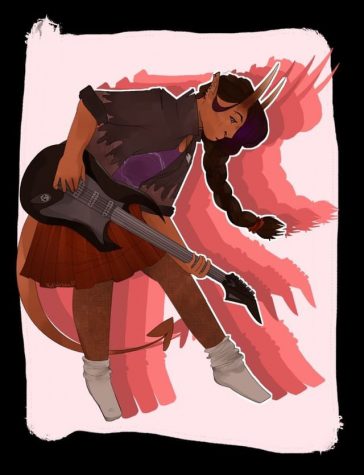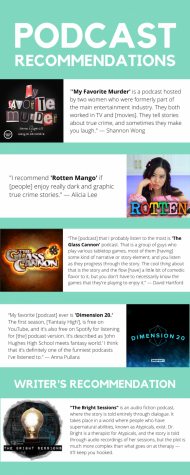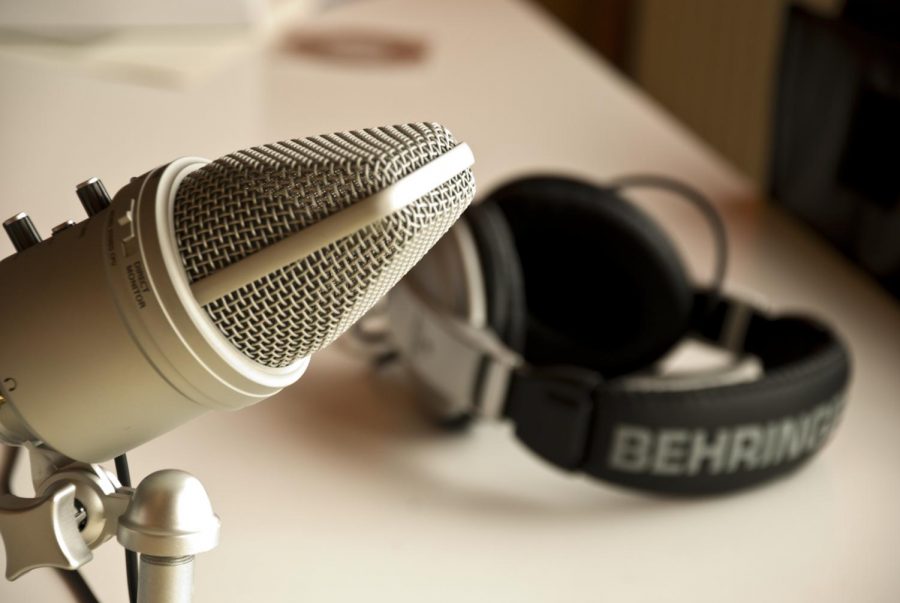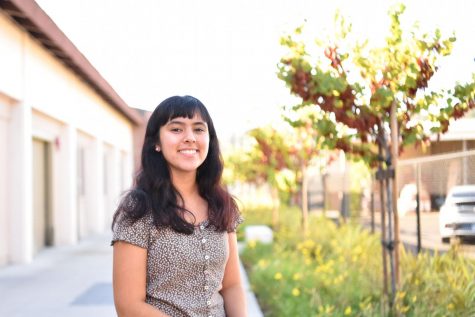The podcast boom
Examining the why behind the rise in popularity of podcasts
Photo by Creative Commons | Used with permission
Podcasts are a rising form of media, whether it’s a form of information or entertainment.
October 24, 2020
“Welcome, one and all, to Dimension 20! Our cast of players will assume the role of heroic adventurers embarking on a dangerous quest.”
With a single click of the play button, an exuberant voice floats into the air, brimming with eagerness and dramatic inflection, reminiscent of a medieval carnival. This is the very beginning of the first episode of “Dimension 20,” a podcast which consists of a group of friends playing the tabletop role-playing game Dungeons and Dragons (D&D).
“Dimension 20” is currently sophomore Anna Pullara’s favorite podcast, but it was not her first experience with podcasts –– that was when she was in sixth grade.
“I had just gotten out of D&D Club [in sixth grade], which turned out to be a massive, to put it bluntly, failure because I didn’t like the people there,” Pullara said. “But I did want more D&D content, so that’s when I [realized], ‘Hey, everyone online is talking about this [podcast], so maybe I should dip my toe into that.’”

Pullara finds that she’s more attracted to story-based podcasts in general, because it’s satisfying to follow characters as they evolve. The podcasts also help her enter a “creative zone,” and Pullara says she has even made fan art for podcasts before. According to Pullara, what makes D&D podcasts such as “Dimension 20” particularly unique is their structure.
“It’s kind of like reading a story, except you know that it’s improvised, and it’s fun because there’s a lot of humor involved because the people who are running the podcast want you to be entertained,” Pullara said. “It’s nice to put [it] in the background of whatever you’re doing, so you can follow a story and hear the important parts, but you can tune a lot of battle scenes out. It’s like following your friends along on an adventure [while] spectating.”
On the other hand, sophomore Alicia Lee just started listening to podcasts since shelter-in-place restrictions this past June, when YouTuber Stephanie Soo began “Rotten Mango,” a podcast version of her true crime stories. She credits her interest in podcasts more to the genre of true crime rather than to podcasts themselves.
“If I had the time, [I would probably] go look for podcasts about music because I find that really interesting,” Lee said. “[I] generally [listen to] podcasts with the topics that I’m interested in, or even the creators, which is why I listen to ‘Rotten Mango’ because I already know this creator on a different platform. So maybe when [other creators] expand to podcasts [and] I’m interested in their content, I [would] follow up and listen to what they have to say.”
Senior Shannon Wong, who is also a fan of the true crime genre, has been listening to the true crime podcast “My Favorite Murder” since her sophomore year. She believes that true crime is a popular genre in podcasts because of the lack of visuals.
“Listening to [true crime podcasts] versus seeing it yourself, even if it’s reenactments or just pictures from the crime scene, takes that scary element away,” Wong said. “It opens up the audience a little bit more because you don’t have to visualize it — the visual isn’t right in front of you, [so] you can almost ignore the fact that it’s real because it’s such a dark and depressing thing.”
While Soo’s YouTube content is normally mukbangs, videos in which people interact with an audience while eating food, Lee explains that “Rotten Mango” is where she talks about darker crimes, which she feels are not appropriate to mention while eating. In “Rotten Mango,” Lee believes that the lack of visuals allows Soo to focus on the storytelling, an aspect of the podcast that Lee thoroughly enjoys.
“Sometimes when [people] watch videos, [they] can get distracted by the visuals … or people sometimes might not even watch videos for the audio purposes,” Lee said. “It can be helpful because [with] a podcast, you just listen to it, [but] sometimes when I watch YouTube videos, I feel like I have to watch it because then I’m missing out on the video aspect.”
History teacher David Hartford finds another benefit from the exclusively auditory nature of podcasts — it is easier for him to do other tasks, such as go on runs or get ready in the morning while listening. Hartford listens to a wide variety of podcast genres, such as literature, history, tabletop gaming, news and those of his current hobbies, such as woodworking. According to Hartford, the benefits of listening to podcasts are their convenience, as he can pause and play them as needed, and their in-depth, focused content.
View this post on Instagram
“[I read a book that described how] media has a hard time really getting into topics, because it has to start with the base assumption that its listener doesn’t know anything about what they’re talking about,” Hartford said. “I feel like radio tends to fall into that line — if they want to go into a topic, it has to be very superficial, [whereas in] podcasts, there are people [whose] lives are so dedicated to whatever topic that they will have hundreds of episodes on super niche ideas … where you’re not going to get that on a radio station, per se. So I think for me, the biggest piece is really being able to get into [the podcast].”
Hartford acknowledges that while podcasts are fairly popular in his circle of friends, it may be difficult for those without adequate information to start listening.
“When [my fiance] was first getting into running, I was like, ‘Well, do you have a podcast that you like?’” Hartford said. “For some people, I can see how that can be intimidating because there’s so much out there. It’s like, where do you start and what’s good and what’s not? And some people don’t want to put the time into digesting that, in which case, maybe the radio is better, where it’s just, ‘We’re gonna curate it for you, and you don’t have to make any decisions.’”
Wong believes that podcasts generally don’t differ much from TV shows, books or YouTube videos, but that they are less popular than other forms of media possibly due to their long runtimes and difficult engagement because of the lack of visual elements. However, she particularly enjoys the collaborative atmosphere that podcasts can have.
“A lot [about podcasts] is just [that they’re] a lot more conversational, a little less formal,” Wong said. “In YouTube videos it’s also kind of informal, but in comparison to books or articles from news media, there’s a very formal tone. It doesn’t feel like you’re talking to a person, it just feels like information is fed to you. I think in a podcast form, especially when there’s more than one person … it feels like a conversation, it feels like you can laugh along with them if they’re making a joke or something like that.”

Pullara believes that podcasts, specifically those about D&D, are popular among many of her friends and the queer community. According to her, that correlation is related to the friendly atmosphere that can be found in D&D podcasts.
“The ‘found family’ trope is really common in D&D, which makes it really attractive to queer people, because that’s something we really enjoy, [such as] when a whole bunch of friends can find family beyond their blood, which comes with a party adventure game where you traverse hardships with each other, which is very common in D&D,” Pullara said. “Being able to listen to that, without having to go through all the stress of planning and writing and scheduling is super nice. Because that attracts a lot of queer people, then more who don’t have those specific problems also join in because they can be friends.”
According to Forbes, podcasts became a mainstream source of media in 2019, and they only seem to be gaining a larger audience. Spotify’s podcast audience has nearly doubled since 2019, amassing over 299 million monthly active listeners. Lee believes that podcasts have the potential to be more widely listened to if they were advertised more, so people would be more likely to try them out regardless of whether they truly became fans or not. However, Pullara is uncertain about how she would feel if the popularity of podcasts continues to rise.
“On one hand, yes I do like podcasts, I’d love to talk with people about them, but it’s also a nice thing that I enjoy myself because it’s niche,” Pullara said. “I can just leave that world when I want to, instead of it being a popular Netflix series that people are screaming about all the time.”
Hartford himself has listened to podcasts less during shelter-in-place restrictions because he is now busy with remote teaching. He considers podcasts to be “easily digestible and convenient media” and acknowledges the various uses, whether they be simply for background noise or as a way to study or learn a new skill.
“I think podcasts are an incredibly valuable tool,” Hartford said, “Even if there are a ton of possibilities and options out there, I encourage people to just take a stab. Dig and find a podcast, you might like it, you might not, and that’s okay. Just keep moving on until you find something you do [enjoy].”




























